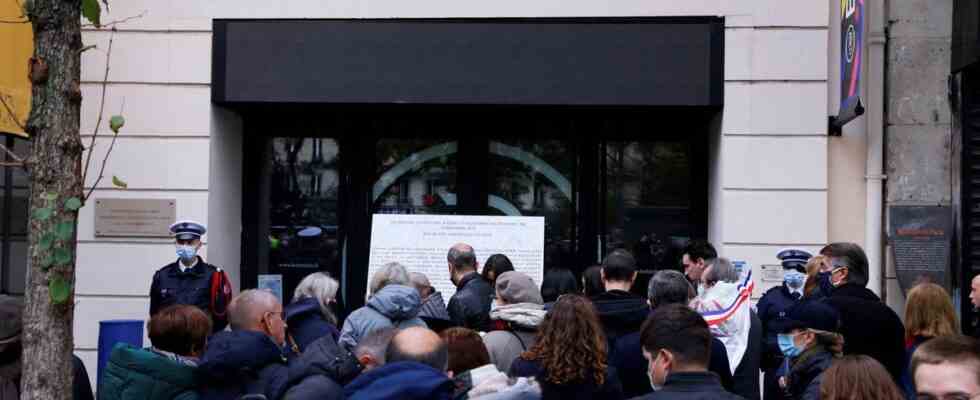To punish a “accomplicative blindness”the prosecution demanded four years in prison on Friday, including one year, against the mother of one of the suicide bombers of the Bataclanjudged for having sent money to her son in the Iraqi-Syrian zone before the attacks of November 13.
The decision was reserved for Wednesday, March 9. For more than seven hours, the Paris Criminal Court considered a file “irrigated” by the documents of the investigation into the attacks which left 130 dead in Paris and Saint-Denis, the trial of which has been continuing since September. The mother of Foued Mohamed Aggad, one of the three jihadists who attacked the Paris concert hall, was being prosecuted for having sent her son and his companion seven money orders, for a total of more than 13,000 euros, and a parcel between August 2014 and August 2015.
Fatima Hajji, 54, has “placed filial love above all”argued the prosecutor at the end of the hearing, requesting his conviction for terrorist financing to four years in prison, one of which is firm, and a fine of 5,000 euros. “I’m not telling you that she shared this ideology” corn “that she was fully aware of the nature of the Islamic State group and of her son’s activities. Knowingly, she supported him financially.estimated the anti-terrorism magistrate.
He also requested ten years’ imprisonment for terrorist criminal association against Hajira Belkhir, the companion of Foued Mohamed Aggad, presumed dead in Syria in 2017. Originally from Bas-Rhin, the jihadist left in December 2013 for Syria, to 21 years old. Hajira Belkhir, who had met him on Facebook, joined him in March 2014. The couple married religiously in Syria and then lived in several towns controlled by IS, according to the investigation.
“Rewriting of his memories”
At the helm, Fatima Hajji, often moved, repeated: “I did not support the cause, I supported my son, his wife and his future child”. She helped the couple because they “needed it to survive, to live“. “He said they had no medicine, there was shelling, there was a shortage of food”, said the defendant, blue denim dress and black scarf. His son also spoke to him about “pay smugglers” to leave war zones. However, noted the president, in his contacts “almost daily” with his son, he told him he wanted to stay and “combat”, that if he returned to France it would be for “do something dirty” and told him of his will to die “as a martyr”.
Raising in the course of his questions a “rewriting of (his) memories” or statements contrary to those held in police custody, the president, sometimes annoyed, pointed out that the warrants were addressed to IS collectors: there, “you fund this system”. “Since then, with what I’ve learned, yes…”replied the defendant, hesitantly. “All that mattered to me at that time was to be able to save my son, his wife and his future child and in no way to finance any terrorist enterprise”.
“Denial”
In 2015, she mailed a package of “medications”, “clothes”, “vitamins”, “perfume”… A mailing after the attack on Charlie Hebdo. “What do you think of the attacks, madam?”asked the president. “I condemn them”, “I am against all that, against violence”she said, conceding to have been “manipulated” by his son. “Having seen nothing and made sure not to see, I’m terribly sorry for that.”
On August 23, 2015, Foued Mohamed Aggad made remarks “farewell” in video clips recorded by his family. His mother will then only receive a message until the evening of November 13. At 11:55 p.m., he wrote to her “I love you” and “I will soon meet Allah”. He will be killed in the assault on the Bataclan.
Contesting part of the payments, his lawyer, Me Matthieu Bagard, argued that the defendant had a “panic fear” for his children and that his judgment had been “obscured” by a “terrible smokescreen”.

